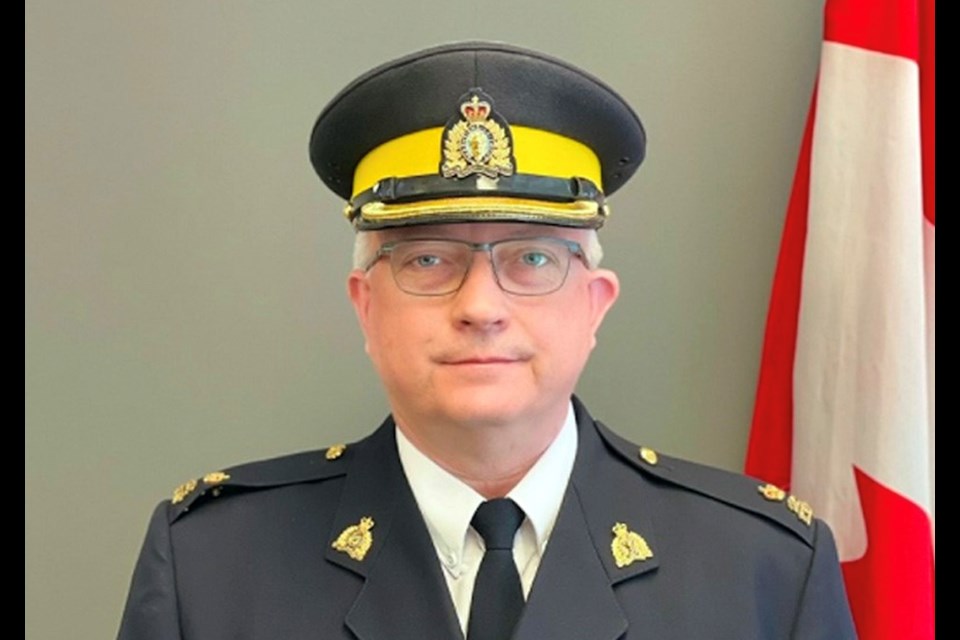Nearly seven Coquitlam Mounties on average are tasked to find missing people in Coquitlam and Port Coquitlam every day.
And most of them are clients of the Red Fish Healing Centre for Mental Health and Addiction, the detachment's supervisor told council and civic staff this week.
In presenting his second trimester report before council-in-committee at its meeting on Monday, Oct. 30, Officer-in-Charge Keith Bramhill zeroed in on the rising number of mental health-related calls for service, which are putting pressure on officers on duty.
Between May and August 2023, police saw a 17 per cent uptick in files compared with the three-year average, noting the demands from Red Fish, a provincial facility that opened on the səmiq̓ʷəʔelə/Riverview Lands in 2021, as well as the homeless shelter at 3030 Gordon Ave. in Coquitlam.
From January to September, Coquitlam RCMP were out to Red Fish 301 times — a 24 per cent rise since 2022 — and most of the files have involved a Form 21 warrant to locate a missing person, costing the detachment about $500,000 in labour so far this year (each Form 21 warrant takes between 24 and 40 hours to process, contact family and collect DNA, among other things).
By comparison, police have attended 3030 Gordon Ave. 25 times this year, a rise of 6.5 per cent since 2022.
For the Red Fish calls, police "just don’t hope and wait for them to return," Bramhill said, noting the more than 100 steps and procedures that officers have to follow to find vulnerable people.
Bramhill said while Mounties are pleased to have 105-bed facility in Coquitlam to help people with the most severe, complex use and mental health issues, "it has had a real impact on police labour and resources."
And that bill is passed on to Coquitlam taxpayers, commented Coun. Craig Hodge, chairperson of the city's Community Safety Advisory Committee, in calling Red Fish a financial "burden" to the municipality.
"I'm really concerned that it's putting a drain on our resources," he said.
Coun. Brent Asmundson also voiced his concern, saying Coquitlam agreed to host Red Fish without knowing the true policing costs.
"We didn't think it would have the impact that we thought it was going to have," Bramhill added.
Still, he said senior staff at the Coquitlam RCMP are calling Red Fish directors daily about operations and the facility's "growing pains."
"I know that they care and they’re doing their very best."
Government response
Jennifer Whiteside, B.C.'s minister for Mental Health and Addictions, was not available for an interview with the Tri-City News at time of publication, Nov. 2.
However, in a statement, the ministry made clear that Red Fish clients aren't at the facility due to criminal behaviour or activity.
Rather, "they come from all walks of life and regions of the province, and they are there to receive help for their complex health care issues."
"At times when a client does not return on time when they have left the facility on a physician-ordered pass, Red Fish may work with local police agencies or RCMP to help locate them and have them come back, for their own safety.
"This model of care is working. Preliminary evaluation shows that 95 per cent of Red Fish patients are seeing improved mental health between admission and discharge."
The BC Mental Health and Substance Use Services (BCMHSUS) also referred the Tri-City News to its previous letter to the editor about missing clients.
In it, Dr. Vijay Seethapathy, chief medical officer, and chief operating officer Jennifer Duff state that a key part of recovery is for clients to get passes, at the discretion of their psychiatrist, to leave Red Fish and be in the community.
"It allows clients to do everything from participating in outdoor recreation, to taking up activities of daily life such as setting up bank accounts or seeking long-term housing," they wrote.
"The vast majority return safely and on time, but some do not. Across Canada, it is common for clients on passes to suffer a relapse or decide they no longer want to be in treatment. We work hard to retain clients and welcome them back after an AWOL, even if they have taken substances while on a pass, or if they struggle with motivation."
Seethapathy and Duff contended one certified clients goes AWOL every one to two days.
Other T2 news
Meanwhile, Bramhill said policing costs rose between May and August 2023 for overtime and E-Division administration.
Overtime bills shot up by 15 per cent last year and the trend continues, he said, while Division administration expenses have gone up 45 per cent since 2020 (about $12,120 per officer) as overall vacancies at the BC RCMP headquarters rise.
The three officer positions that Coquitlam council approved last year have also yet to be filled due to the national shortage of police officers.
In addition, to handle the mental health call load, a Mobile Integrated Crisis Response (MICR) team is expected to be launched in the Tri-Cities by the end of the year; that team will include two psychiatric nurses under Fraser Health who will ride with police.
Bramhill said the detachment will also be restarting its auxiliary policing program next spring and its Junior Mountie camp in next summer.





